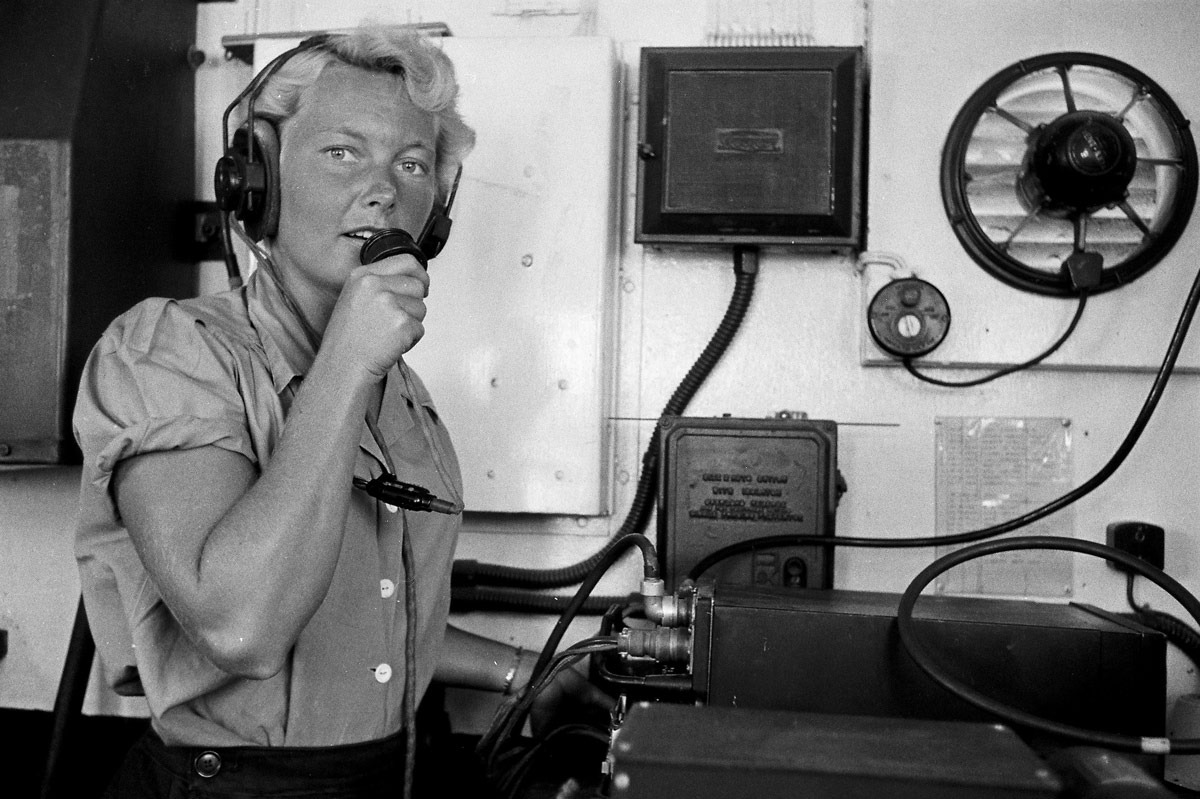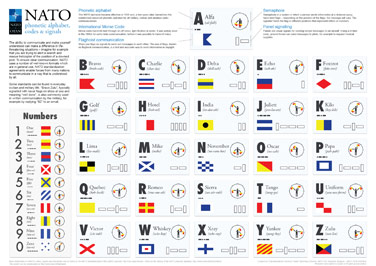Origins
Symbols

The NATO phonetic alphabet
Imagine that you are a radiotelegraph operator during the war trying to warn soldiers on the front lines of an incoming mustard gas attack. Messages can be distorted due to the noise of battle, poor broadcast signal, or even language barriers. However, if the transmission uses a radiotelephonic spelling alphabet – substituting a code word for each letter of the alphabet – then critical messages are more likely to be understood correctly.
Can you identify all 26 letters of the NATO Phonetic Alphabet?
Take the quiz below!
Since 1956, the NATO Phonetic Alphabet has enabled forces from many countries to communicate in a way that is understood by all. Test your knowledge of the full alphabet below, then scroll down to learn more about the history of this unique system (no peeking)!

Men of the Durham Light Infantry operate a radio and keep watch for the enemy, near Bayeux, Normandy, 11 June 1944. © IWM (B 5378)
The NATO phonetic alphabet became effective in 1956 and just a few years later became the established universal phonetic alphabet. However, it took several adaptations before the version used today came into effect.
In the 1920s, the International Telecommunication Union (ITU) produced the first phonetic alphabet to be recognized internationally. It featured names of cities across the globe.
Amsterdam, Baltimore, Casablanca, Denmark, Edison, Florida, Gallipoli, Havana, Italia, Jerusalem, Kilogramme, Liverpool, Madagascar, New York, Oslo, Paris, Quebec, Roma, Santiago, Tripoli, Uppsala, Valencia, Washington, Xanthippe, Yokohama, Zurich.
On the military side, the United States adopted a Joint Army/Navy Phonetic Alphabet, called the Able Baker alphabet after the first two code words, across all of its military branches in 1941. Two years later, the British Royal Air Force decided to use the Able Baker alphabet as well.
Able, Baker, Charlie, Dog, Easy, Fox, George, How, Item, Jig, King, Love, Mike, Nan, Oboe, Peter, Queen, Roger, Sugar, Tare, Uncle, Victor, William, X-ray, Yoke, Zebra
A common criticism of these alphabets was that they were rather English in composition. A new version incorporating sounds common to English, French, and Spanish was proposed by the International Air Transport Association (IATA) and came into effect on 1 November 1951 for civil aviation only. It is similar to the one used today.
Alfa, Bravo, Coca, Delta, Echo, Foxtrot, Gold, Hotel, India, Juliett, Kilo, Lima, Metro, Nectar, Oscar, Papa, Quebec, Romeo, Sierra, Tango, Union, Victor, Whiskey, eXtra, Yankee, Zulu
As militaries and NATO continued to follow the Able Baker phonetic alphabet, it was clear the need for a universal phonetic alphabet still remained. A review of the Able Baker alphabet, spearheaded by NATO Allies US and UK, was conducted.

Phone Operator
A proposal changing the words for the letters C, M, N, U, and X only was submitted to the International Civil Aviation Organization (IACO) although debate continued over the code word for the letter N (Nectar versus November) (see declassified document from the NATO Archives: SGWM-762-54). On 8 April 1955, the North Atlantic Military Committee Standing Group advised that whether or not the proposal was approved by the IACO, the alphabet would “be adopted and made effective for NATO use on 1 January 1956” (see declassified document from the NATO Archives: SGM-0217-55).
Allies hesitated to adopt the alphabet for national use until the ICAO ruled on the proposal thus creating a rather odd situation in which NATO Military Commands would be the sole users of the proposed phonetic alphabet. Luckily this situation did not last for long as the ICAO approved the alphabet, with November as the code word for the letter N.
On 21 February 1956, Member States were advised “that the new Phonetic Alphabet is to be made effective in NATO 1 March 1956” (see declassified document from the NATO Archives: SGM-0156-56). The ITU formally adopted it a few years later making it the established universal phonetic alphabet governing all military, civilian and amateur radio communications. As it was NATO Allies who had spearheaded the final revision, it became known from that point on as the NATO Alphabet.
Alfa, Bravo, Charlie, Delta, Echo, Foxtrot, Golf, Hotel, India, Juliett, Kilo, Lima, Mike, November, Oscar, Papa, Quebec, Romeo, Sierra, Tango, Uniform, Victor, Whiskey, X-ray, Yankee, Zulu

